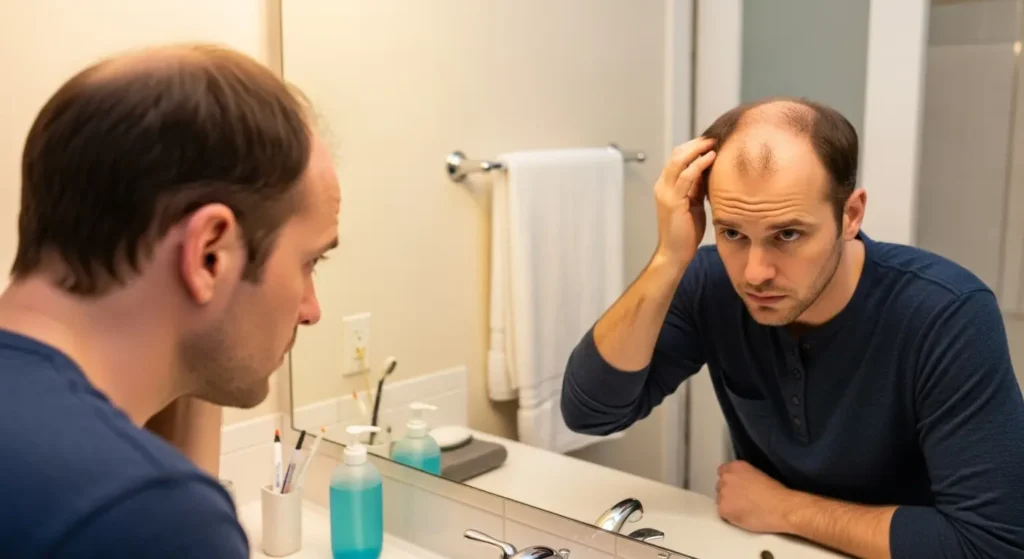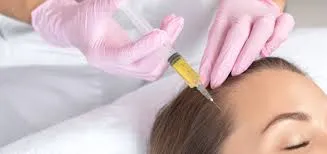If you’re wondering can an endocrinologist help with hair loss, the answer often depends on whether hormones are driving your thinning hair.
Many people experience unexplained shedding linked to thyroid disorders, PCOS, or other endocrine issues. In this guide, you’ll learn how endocrinologists identify hormone-related causes, what treatments are available, and when to see both a dermatologist and an endocrinologist.
By the end, you’ll know your next steps toward healthier, fuller hair with expert insights and practical advice.

Understanding Hair Loss & When Hormones Are at Play
Hair loss isn’t always about genetics. While androgenetic alopecia (male or female pattern baldness) is common, hormonal imbalances often play a hidden role.
Types of Hair Loss
- Pattern Hair Loss (Androgenetic Alopecia): Usually genetic, linked to DHT sensitivity.
- Telogen Effluvium: Sudden shedding triggered by stress, illness, or hormonal shifts.
- Autoimmune Causes (e.g., Alopecia Areata): The Immune system attacks hair follicles.
How Hormonal Imbalances Disrupt Hair Growth
Hormones regulate the growth cycle of hair. When they fall out of balance, hair follicles enter a resting or shedding phase prematurely.
Key hormones that influence hair:
- DHT (Dihydrotestosterone): Shrinks follicles in androgenic alopecia.
- Thyroid Hormones (T3, T4, TSH): Both hypothyroidism and hyperthyroidism can cause thinning.
- Estrogen & Progesterone: Drops after childbirth or menopause often trigger shedding.
- Cortisol (Stress Hormone): Prolonged stress leads to telogen effluvium.
- Insulin Resistance (PCOS): Elevated androgens contribute to hair thinning in women.
Dermatologist vs Endocrinologist: Who Should You See First?
Role of a Dermatologist
Dermatologists are often the first stop for hair loss. They:
- Examine scalp and hair shaft.
- Perform scalp biopsies if needed.
- Prescribe topical treatments (like minoxidil).
- Offer procedures such as PRP or microneedling.
Role of an Endocrinologist
Endocrinologists specialize in diagnosing and treating hormone imbalances that may cause hair loss. They focus on:
- Thyroid disorders (hyper/hypothyroidism).
- PCOS and insulin resistance.
- Menopause or low estrogen conditions.
- Adrenal disorders (cortisol imbalance).
How an Endocrinologist Diagnoses Hormonal Hair Loss
Key Hormonal and Blood Tests
An endocrinologist may order:
- Thyroid Panel: TSH, Free T3, Free T4.
- Androgen Panel: Testosterone, DHEAS, SHBG.
- PCOS Markers: LH, FSH, insulin, fasting glucose.
- Cortisol Levels: To assess stress or adrenal disorders.
- Iron/Ferritin: To rule out nutritional deficiencies.
Assessment of Symptoms & History
Beyond lab results, endocrinologists consider:
- Menstrual history and fertility issues (PCOS clues).
- Weight changes, fatigue, or mood shifts.
- Stress patterns and lifestyle triggers.
Treatment Approaches via Endocrine Care
Hormonal Therapies
- Thyroid Regulation: Levothyroxine for hypothyroidism or antithyroid drugs for hyperthyroidism often restore hair growth within months.
- Anti-Androgens (e.g., Spironolactone): Block DHT effects in women with PCOS or androgenic alopecia.
- Hormone Replacement Therapy (HRT): Supports women during menopause when estrogen decline causes shedding.
Pro Tip: Endocrinologist-guided dosing prevents overtreatment, which could worsen symptoms.
Complementary Therapies
Endocrine care often pairs with dermatologic options such as:
- Minoxidil (topical/oral).
- PRP therapy.
- Microneedling.
- Hair transplant in resistant cases.

Monitoring & Follow-Up
- Regular labs every 3–6 months.
- Visible improvement typically within 3–9 months, depending on hormone balance.
- Collaboration with dermatologists for combined therapy.
Additional Considerations & When to Seek Urgent Help
Hair Loss with Other Symptoms
Seek immediate care if you notice:
- Severe fatigue and rapid weight change.
- Sudden patchy hair loss with swelling.
- Hair loss plus skin pigmentation changes.
These may indicate underlying endocrine emergencies.
Emotional Impact & Support Resources
Hair loss affects self-confidence and mental health. Support groups and counseling can make the journey easier.
Emerging & Future Therapies
Hair Cloning: Future approach with active clinical trials.
Laser Caps: Low-level laser therapy shows promise in stimulating follicles.
Exosomes: Regenerative medicine option under study.
FAQs
Can endocrine tests really pinpoint the cause of my hair loss?
Yes, hormone panels often reveal thyroid, androgen, or insulin imbalances contributing to thinning.
How long before I see improvements?
Most patients notice reduced shedding within 3–6 months after correcting hormonal issues.
Is spironolactone safe, and who can use it?
It’s commonly prescribed for women with PCOS or hormonal hair loss. It is not recommended for men due to side effects.
What if my tests are normal, but I still have thinning hair?
Hair loss can be multifactorial. A dermatologist may need to assess non-hormonal causes such as autoimmune conditions, nutrient deficiencies, or genetic alopecia.
Should I see both a dermatologist and an endocrinologist?
Yes this combination ensures hormonal imbalances are corrected while dermatologic treatments directly stimulate hair growth.
Next Step
If your hair loss might be hormone-related, the right specialist can make all the difference. Endocrinologists identify and treat the root hormonal causes, while dermatologists provide targeted scalp therapies.
👉 Book a consultation with Dr. Rana Irfan in Islamabad today to discuss your options and start your journey to healthier, fuller hair.
